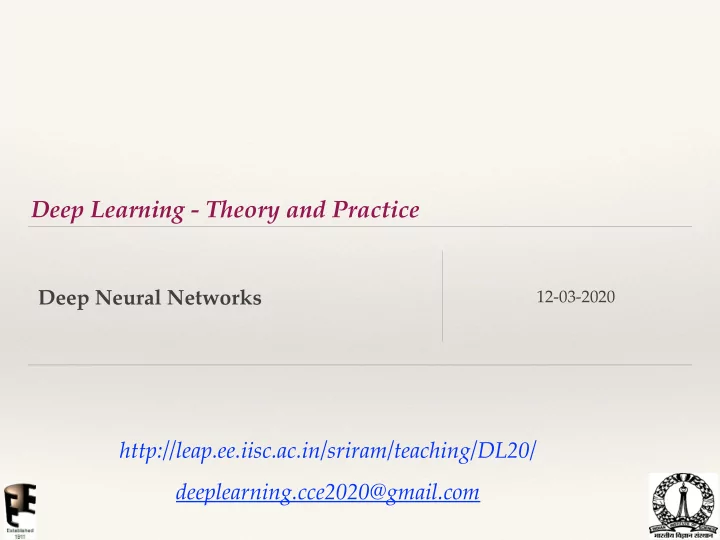

Deep Learning - Theory and Practice Deep Neural Networks 12-03-2020 http://leap.ee.iisc.ac.in/sriram/teaching/DL20/ deeplearning.cce2020@gmail.com
Logistic Regression ❖ 2- class logistic regression ❖ Maximum likelihood solution ❖ K-class logistic regression ❖ Maximum likelihood solution Bishop - PRML book (Chap 3)
Typical Error Surfaces Typical Error Surface as a function of parameters (weights and biases)
Learning with Gradient Descent Error surface close to a local
Learning Using Gradient Descent
Parameter Learning • Solving a non-convex optimization. • Iterative solution. • Depends on the initialization. • Convergence to a local optima. • Judicious choice of learning rate
Least Squares versus Logistic Regression Bishop - PRML book (Chap 4)
Least Squares versus Logistic Regression Bishop - PRML book (Chap 4)
Neural Networks
Perceptron Algorithm Perceptron Model [McCulloch, 1943, Rosenblatt, 1957] Similar to the logistic regression Targets are binary classes [-1,1] What if the data is not linearly separable
Multi-layer Perceptron Multi-layer Perceptron [Hopfield, 1982] non-linear function ( tanh,sigmoid ) thresholding function
Neural Networks Multi-layer Perceptron [Hopfield, 1982] non-linear function ( tanh,sigmoid ) thresholding function • Useful for classifying non-linear data boundaries - non-linear class separation can be realized given enough data.
Neural Networks Types of Non-linearities tanh sigmoid ReLu Cost-Function Cross Entropy Mean Square Error are the desired outputs
Learning Posterior Probabilities with NNs Choice of target function • Softmax function for classification • Softmax produces positive values that sum to 1 • Allows the interpretation of outputs as posterior probabilities
Need For Deep Networks Modeling complex real world data like speech, image, text • Single hidden layer networks are too restrictive. • Needs large number of units in the hidden layer and trained with large amounts of data. • Not generalizable enough. Networks with multiple hidden layers - deep networks (Open questions till 2005) • Are these networks trainable ? • How can we initialize such networks ? • Will these generalize well or over train ?
Deep Networks Intuition Neural networks with multiple hidden layers - Deep networks [Hinton, 2006]
Deep Networks Intuition Neural networks with multiple hidden layers - Deep networks
Deep Networks Intuition Neural networks with multiple hidden layers - Deep networks Deep networks perform hierarchical data abstractions which enable the non-linear separation of complex data samples.
Deep Networks - Are these networks trainable ? • Advances in computation and processing • Graphical processing units (GPUs) performing multiple parallel multiply accumulate operations. • Large amounts of supervised data sets
Recommend
More recommend